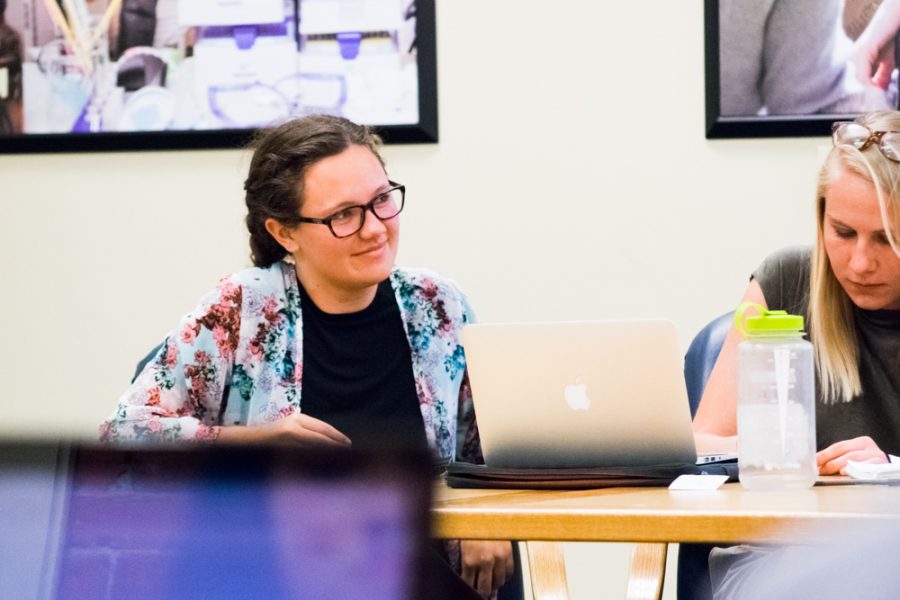ASWC Striving for Gender Balanced Representation
April 28, 2016
If you wander into Memorial 331 on a Sunday night, you’re likely to find a room full of student representatives deep in discussion over the minutia of college policy and current issues. If you take a good long look around that room, you will see a room that is fairly representative of Whitman’s campus: a majority of students who are white, and a smaller majority that are women.
This composition is new to the Associated Students of Whitman College (ASWC). As recently as a few years ago, ASWC was predominately men. Senior Anya Tudisco, current Finance Chair, who has been active in ASWC for her four years on campus, recalls the 2014 senate election as a watershed moment for women in ASWC.

“Seeing that this was something that girls were involved in was really exciting,” said Tudisco. “My first year we definitely had fewer women than men in the senate I think by a lot, but … [in 2014] when all the freshmen senators were girls, things kind of started to shift and now I think it’s 50/50 or more [women].”
Though an increase in the number of women senators has been hailed as a move towards a more representative body, concerns linger about women in Executive Council (EC) positions. Currently, ASWC’s elected positions in the EC are well-balanced, with men in the Presidency and Vice Presidency, and women as Nominations and Finance Chairs.
“[Women] may stay in Senate longer before considering themselves ready to move up to an Executive Council position,” said Director of Student Activities Leann Adams, who advises ASWC. “I think that has much more to do with the system and gender in general than an individual woman choosing not to run … Women [say], ‘I’ll be a senator for a few years,’ and a lot of my male senators [say], ‘I’ve done that I’m … moving up the ladder to the next leadership position.’ And so I have a lot of conversations that look different depending on whether I’m speaking with my men or my women.”
The prevalence of women in ASWC has not successfully solved gendered imbalances in the way most men and women present themselves and lead committees.
“I think [it] tends to be harder for women, that they feel they really need to balance their work and personal lives but for men I think they often have been taught that it’s okay to put those things in two separate boxes,” said sophomore Nominations Chair AnnaMarie McCorvie. “Often for the women on ASWC, it’s ‘I’m concerned my committee doesn’t like me, I’m concerned that by making this decision and this vote I have isolated myself from this friend’ and then [for] men it’s rarely those concerns.”
For some students, concerns about gender aren’t limited to a parity between men and women’s participation. People publicly identifying outside the gender binary are not often seen in ASWC, as members of senate or the Executive Council. Sophomore NoahLani Litwinsella, a member of the Oversight Committee, recognizes this absence, but believes ASWC is doing all it can to combat it.

“I think ASWC is becoming, especially since the enactment of the gender and pronoun resolution, a lot more aware of addressing parties that come to senate by their preferred pronoun,” said Litwinsella. “I think that there definitely is a deficit of different people on the gender spectrum within ASWC but I don’t particularly see that being a fault of ASWC so much as, if I had to hazard a guess, a lot of people who do identify differently than the normal binary [don’t] tend to run a whole lot. I know that we have had a lot of people who are very involved with LGBTQ and the queer community at Whitman.”
The Nominations Committee is often seen as one of the most inclusive pieces of ASWC’s network, and Adams hopes to look to nominations to find ways to improve ASWC’s inclusivity overall. Many place hope in Arthur Shemitz’s presidency to increase diversity and inclusion. Ultimately, members of ASWC aim to create an environment that is welcoming to Whitman students regardless of identity.
“Having so many women in Senate now is so awesome,” said Tudisco. “I just look around the room and see freshman, sophomores, juniors and seniors in all sorts of different positions and they’re some of the most powerful voices in the room … people are ready to do their jobs as student representatives and it’s not … that gender isn’t a present piece of the puzzle, but I do feel like having a majority of women in that room makes it a space where people can experiment with being leaders.”






